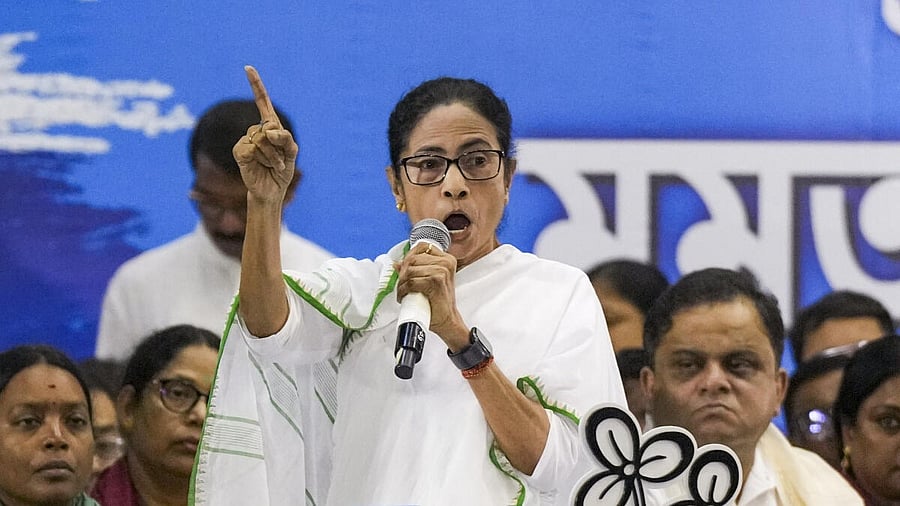
West Bengal Chief Minister and TMC chief Mamata Banerjee addresses the party workers’ meeting at Netaji Indoor Stadium, in Kolkata, West Bengal, Thursday, Feb. 27, 2025.
Credit: PTI Photo
The Trinamool Congress (TMC) held a huge meeting in Kolkata on February 27, chaired by West Bengal Chief Minister Mamata Banerjee and attended by delegates from all levels of the party down to the blocks. Banerjee, the party’s leader, used the occasion to make it clear that it was her writ alone that ran in the party.
During an about an hour-long speech to the party faithful, she first laid down the line, which, it appears will form the main plank of the TMC’s campaign for the Assembly elections scheduled for no later than March-April 2026. Banerjee devoted a considerable part of her speech to the manipulation of the voters’ list in West Bengal. She contended that an unholy alliance of the Union government and the Election Commission of India (ECI) was conspiring to add names from outside the state to the electoral lists, as she obliquely suggested had been done in Delhi and Maharashtra in the recent Assembly elections, which the Bharatiya Janata Party (BJP) won handsomely despite early indications that the Indian National Developmental Inclusive Alliance (I.N.D.I.A.) would perform well.
She pointed to the appointment of Gyanesh Kumar, a Union home ministry mandarin considered close to Union Home Minister Amit Shah by association, as chief electoral commissioner, to drive home the point that the current regime was undermining all institutions. While trotting out some evidence in support of her claim that the rolls were being manipulated, she also announced the formation of a team, to be headed by West Bengal TMC chief Subrata Bakshi, and including party general secretary and Diamond Harbour MP Abhishek Banerjee, and other seniors, to report to her every three days on voter manipulation.
Banerjee’s line of attack is neither quixotic nor random. It helps her to do two things. First, it alerts her constituency to the possibility of manipulation. Second, it helps her develop an argument that can combine Bengali particularism, which the party used successfully in the 2021 Assembly and 2024 Lok Sabha election campaigns, with a counter to the BJP’s old line of infiltration and the padding of electoral rolls with the names of Bangladeshi infiltrators. She’s got out of the blocks fast and even gestured at the Citizenship (Amendment) Act (CAA) and National Register of Citizens (NRC) nexus as the means of manipulation. ‘I appeal to the people to check the voters lists themselves as well. Or else, they might use the NRC-CAA tools,’ she said.
Having set the 2026 campaign somewhat in motion, Mamata Banerjee made it clear that she was completely in charge of the TMC, and would not tolerate the inter-generational divide in the party, a euphemism for the attempts by a younger coterie that has coalesced around Abhishek Banerjee for some time now. The first sign was that apart from Mamata Banerjee, Abhishek Banerjee was given the stage along with four other MPs — Sagarika Ghose (Rajya Sabha), Yusuf Pathan (Baharampur), Kirti Azad (Bardhaman-Durgapur), and Shatabdi Roy (Birbhum).
But the verbal put-down for everyone harbouring ambitions of using their proximity to Abhishek Banerjee to throw their weight around in and outside the TMC was ruthless. There were one or two people, she said, who have emerged as leaders and who say they are not loyal to the party symbol, claiming to be devoted to ‘their captain’. But she shot down their presumptions, saying, ‘If there is any leader in the party, it is the 'twin flowers' (the party's symbol) and Maa-Mati-Manush.
That the references to some being loyal to ‘their captain’ or ‘particular Dada’ was aimed at a younger group of Abhishek Banerjee acolytes was obvious. Given the circumstances, Mamata Banerjee has taken a wise decision in beginning the job of putting her house in order. TMC-watchers know that however troubled the Mamata-Abhishek relationship may seem at times, when push comes to shove, they pull together. Up until now, and perhaps in the foreseeable future, the reconciliation has usually involved Abhishek Banerjee acquiescing to Mamata Banerjee’s pre-eminence, especially in party matters.
At the February 27 party meeting, Abhishek Banerjee once again swore his loyalty. ‘Even if someone slits my throat, I will hail Mamata Banerjee. I am not a traitor,’ he said, a touch dramatically.
With the February 22-25 West Bengal state conference of the Communist Party India (Marxist) getting overshadowed by the leadership’s controversial draft resolution that is mired in jejune semantic quibbling over whether the BJP is fascist or tends towards neo-fascism, it is clear that the Left is no condition to stage a comeback in West Bengal. The TMC-BJP bipolarity will remain.
(Suhit K Sen is author of ‘The Paradox of Populism: The Indira Gandhi Years, 1966-1977’.)
Disclaimer: The views expressed above are the author's own. They do not necessarily reflect the views of DH.